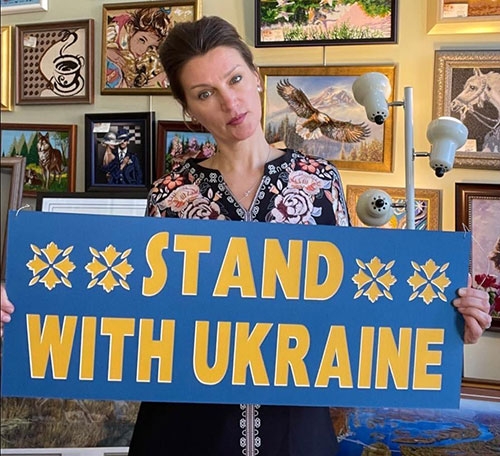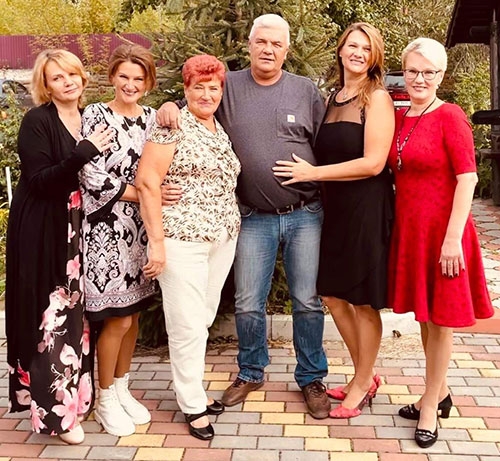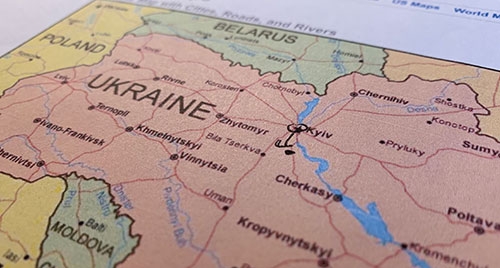You are here
Home ›Waterville’s Lesya Ryzhenkova talks about worries for friends and family in her birth country, after Russia invades Ukraine

In support of her native country ... Lesya Ryzhenkova of Waterville, co-owner of The Good Life Gallery and Frame Shop in Lansing with Mike Kolsrud, shows her support of her birth country following Russia’s invasion of Ukraine last week. A native of Ukraine who gained her U.S. citizenship in April 2021, Ryzhenkova has many family members still living in Ukraine and will be holding an event at her shop in Lansing this Sunday in an effort to share her culture and support her birth country. Submitted photo.

Lesya’s family ... Lesya Ryzhenkova of Waterville is pictured above with her family at a recent reunion where they were all able to get together. Pictured, left to right, are her sister, Tanya, who remains in the family’s home village of Tsentralne; Lesya, now a U.S. citizen living in Waterville; her mother, Olga, who has her green card visa and is currently on an extended visit with Lesya; her brother, Viktor, who remains in the family’s home village of Tsentralne; her sister, Natasha, who is married to Waukon area native Scott Ewing and currently lives in Oregon but has been with Scott in Ukraine on business and evacuated with him to Poland; and her sister, Zina, who was also living in Ukraine but evacuated with the Ewings to Poland. Submitted photo.

Proximity of home village to Ukraine capital ... The family of Lesya Ryzhenkova of Waterville hails from the Ukrainian village of Tsentralne, located about three miles from Myronivka, a larger city in the Kyyiv Oblast district, located approximately 66.5 miles south of the Ukraine capital of Kyiv (as indicated by Lesya with the black circle and downward arrow on the map above). Ukrainians call their capital “Kyiv” (kee-yiv), the spelling being a transliteration of the Ukrainian Київ. The Russian version is “Kiev” (kee-yev). Submitted image.
Ukrainian native to host open house this Sunday at The Good Life Gallery and Frame Shop in Lansing to thank local community and share Ukrainian culture
by Julie Berg-Raymond
Right now, people all over the world are watching, mostly helplessly, while what Reuters News Service has referred to as “the largest military assault by one European state on another since World War Two” is taking place before their eyes - the Russian invasion of Ukraine. They’re trying to understand what is happening and why; they’re contacting loved ones across oceans and continents, seeking information about their whereabouts and safety; and they’re praying - for friends and family; for a nation and its people, independently sovereign for more than 30 years; for peace.
As of this writing, Russian President Vladimir Putin has ordered that country’s nuclear “deterrent forces” to go on high alert. Meanwhile, President Volodymyr Zelensky of Ukraine has agreed to talks with Russia “without preconditions” - on the border between Ukraine and Belarus.
Previously, Ukraine had put several other locations on the table for talks; Russia rejected them and offered Belarus instead. Given that Belarus had provided an entrance point when Russia invaded Ukraine February 24, President Zelensky rejected a meeting within that country. Instead, the border it will be.
Meanwhile, thousands of Russians have taken to the streets of their own country, in protest of the war; and some have been jailed for doing so.
LOCAL CONNECTIONS
Lesya Ryzhenkova of Waterville - originally from Ukraine, a United States citizen since April 2021, and co-owner with her partner, Mike Kolsrud, of The Good Life Gallery and Frame Shop in Lansing - has been spending most of her time since the Russian attack on her birth country trying to get in contact with friends and family members; following phone updates on a Telegram group formed by people on the ground in Ukraine; and watching Ukrainian news on television via Youtube. “I’m not sleeping well; I’ve been crying for three days,” she said during an interview Saturday, February 26.
Lesya’s mother, Olga, has a green card and came to Iowa for an extended visit with her daughter last September. Olga - who loves meeting Lesya’s many friends and whose disposition is normally warm and vivacious - is, Lesya said, “crying all the time now. We’ve been calling our friends, trying to find out where they are. Some of our relatives and friends have to hide in subways and bomb shelters” - as is often the case during this interview, she breaks into tears as she says this - “and it’s so cold there and not comfortable; but they have to hide every time, when sirens ring. In Kyiv, they can’t go outside.
Everything’s closed - they can’t even go out for food. Stores are closed. Banks are closed. Nobody works now. It’s crazy. It’s just crazy.”
Here in Iowa, Lesya and her mother pray, and they watch the news. All of the major news networks in Ukraine have come together, Lesya noted, to share resources and airwaves and to provide around-the-clock information for the country’s citizens.
According to a report published by deadline.com Friday, “all major Ukrainian TV news channels had enacted contingency plans in order to safely continue broadcasting and (a spokeswoman for Ukraine’s 1+1 Media Group said) channels are able to carry on broadcasting both in Ukraine and internationally, while also using YouTube, online platforms and social media. ‘Our task is to protect the information landscape, provide recent events coverage as wide as possible, debunk fake news and share important messages with the society of Ukraine,’ the spokeswoman told Deadline … ‘It is also important to help extinguish mass panic and provide people with clear instructions on how to act in a particular region at a particular moment. There is a continuous broadcasting on the channels and commercial advertising is turned off for non-stop informing.’”
FAMILY
Lesya’s hometown is Tsentralne, a village three miles from the nearest urban center, Myronivka - itself about an hour and a half drive south of Kyiv. (Note: Ukrainians call their capital “Kyiv” (kee-yiv), the spelling being a transliteration of the Ukrainian Київ. The Russian version is “Kiev” (kee-yev)).
Currently, Lesya’s sister, Natasha, and her husband, Scott, are in Poland. Natasha, too, is a United States citizen and is married to Waukon area native Scott Ewing, son of Jerry and Anna Marie Ewing of Waterville. Natasha and Scott live in Oregon but had been in Ukraine for Scott’s work. They are free to return to the United States; but they have decided to stay in Europe, in case they might be able to help family there. Another sister, Zina, also was able to get into Poland - along with one of her daughters (another daughter was already in Poland with Natasha and Scott; both of Zina’s daughters are pregnant) and a 10 year-old granddaughter - after waiting at the border for 36 hours. Another sister, Tanya, and a brother, Viktor, both remain in their hometown south of Kyiv.
Tanya had been in Kyiv but was able to get back to Tsentralne safely. She doesn’t want to leave the country because she doesn’t want to leave her kids, and she feels more comfortable in Ukraine. “I’m so glad I stayed at home,” she recently told Lesya. For everyone whose life has been immediately affected by what is happening in Ukraine, including Lesya and her mother, the question of whether to leave, or to stay; to go there, or to remain where it’s safe is an agonizing one, and the answer may change from one moment to the next. Olga wants to go home to be with her family; and, Lesya said, “I want to be in Ukraine right now. On the other hand, I’m so glad I’m here. I’m an American - but these are my people, my family, my friends.”
HISTORIES
Lesya, born in 1977, grew up when Ukraine was still a part of the Soviet Union. “My mother and father had a good life; I had a wonderful childhood. But we didn’t have freedoms,” she reflected.
That changed in 1989 and 1990 - when, as leader of the Soviet Union, Mikhail Gorbachev was supporting democratic reforms there and enacting policies of glasnost (“openness”) and perestroika (“restructuring”), and anti-communist protests were spreading across central and Eastern Europe. The Berlin Wall collapsed in November 1989, and the overthrow of Communist rule throughout Eastern Europe followed. August 24, 1991, Ukraine declared its independence with 92 percent of the votes in favor of the declaration. The Soviet Union officially dissolved December 26, 1991.
Now, after 30 years of Ukrainian independence, “We don’t know why (Putin) came,” Lesya said. “Right now, we’re thinking, ‘why?’” One thing she does know, she said, is that “It’s not true that Putin came to ‘save’ the country. This is not true at all. In Russian news, he is saying he ‘gave them (Donetsk and Luhansk - known as the Donbas - along Ukraine’s eastern border with Russia) freedom.’ He says, ‘I’m going to save Ukraine from neo-Nazis.’”
But for Lesya - as for millions of her birth country’s citizens, Putin is, very simply, lying - and has been lying for a long time. This point was demonstrated recently, for example, when - having been captured by Ukrainian forces on the second day of fighting - Russian ground soldiers can be seen and heard on video weeping, saying they thought they’d been sent in on a training exercise. “We didn’t know we would be fighting our brothers,” they can be heard saying.
Indeed, this is a very real possibility, as many people - including Lesya - have relatives on both sides of the border. “We’re all mixed,” Lesya said. “My father’s family is from Russia and my mother’s family is from Ukraine.”
The fact is that since 2014, when Russia took the Crimean Peninsula and - though Putin has repeatedly denied this - began backing a rebellion led by separatists in the eastern Donbas region that has, to date, led to more than 14,000 casualties, speculation in “the West” has been that Putin’s eventual aim was to invade more parts of the country and to install a pro-Russia regime in Kyiv.
RESISTANCE
It may be that Putin did not anticipate the level of Ukrainian resistance he has encountered since the invasion. In any case, Lesya is proud of her birth country’s soldiers - and of its president. The feeling she said she is getting from reports she hears is that people are thinking, “we will fight until the last boy will die, and then girls will stand up and fight for our country.”
And as for the president, she said, “He never left our country. He is in Kyiv. He went outside this morning, and said, ‘I’m here.’” It was very dangerous for him, she noted - but he wanted his people to know. Lesya recalled hearing a report that, when offered help with evacuation by the United States, President Zelensky said, “I need ammunition, not a ride.”
“We are so thankful to all who are helping our country in this difficult time, and to countries who are opening their borders for our women,” Lesya said. “With their help and with our brave soldiers and people, we will prevail.” (President Zelensky has temporarily restricted all men aged 18-60 from leaving the country, in a declaration saying this is necessary “in order to ensure the defense of the state, maintaining combat and mobilization readiness of the Armed Forces of Ukraine and other military formations.”)
“We don’t know what will happen after,” Lesya said. There will be infrastructure needing to be rebuilt, for example. “We don’t know yet how bad it will be. Our country will be different.” But, she added, “the world will see how strong we are; they will see we are united.”
SOUL OFFERING
When Lesya attained her U.S. citizenship last year, she told this reporter that “this is my country now. This is my life - this is where I want to be. But I still have my Ukrainian soul inside of me.”
This Sunday, March 6, from 11 a.m. to 2 p.m., Lesya will share some of that soul with her community. She - along with her mother, and Mike - will host an open house at The Good Life Gallery and Frame Shop in Lansing. Ukrainian food will be served, and beverages will be available. Food will be packaged for take-out, because the gallery is small and does not have tables at which to sit and eat; but attendees also are invited to eat in place, if they wish.
A freewill donation will be accepted at the open house, for a humanitarian aid fund Lesya is organizing with the help of her friend, Amy Stracener. Any money collected will be put into a savings account at Kerndt Brothers Bank, for distribution to people in Ukraine when that can safely and appropriately be done.
Right now, Lesya said, it’s not clear what is going to happen and what will be needed. Her concern, though, is that anyone donating to the humanitarian effort she is spearheading knows that the money will be safely held and distributed in a transparent manner. “I hope that people will trust me and know that it is not going into my own pocket,” she said.
Mostly, though, Lesya wants to share her Ukrainian culture with her community here - its warmth and hospitality, its food, its good heart. “If people just want to come, that’s good. I understand everybody has family, and not everybody has money to give; I just want to do this because I want to do this,” she said.
“I’m just asking all my American friends, my family, my neighbors, to pray for Ukraine,” she added. “To ask for peace, and to stand with Ukraine.”
******
More information about Sunday’s open house will be posted on social media throughout the week. Additionally, Glyeb Ewing - Lesya’s nephew, son of Natasha and Scott Ewing, originally of the Waukon area - has started a GoFundMe page for their family in Ukraine, which can be found online by entering the following into a search engine: gofundme.com/f/my4ef6-help-my-family-in-ukraine (see article sidebar below).
SIDEBAR: Waukon High School graduate trying to support family in Ukraine
Following the start of Russia’s invasion of Ukraine last week, Glyeb Ewing, a 2014 graduate of Waukon High School currently living in Oregon, has created a GoFundMe page in support of his family still living in Ukraine, where he was born and raised prior to moving to the Waukon area in his pre-teen years with his family. He is the son of Natasha and Waukon area native Scott Ewing, and the grandson of Jerry and Anna Marie Ewing of Waterville. Glyeb Ewing writes on the page that he has family members who are still living in a small village in Ukraine called Tsentralne, next to Myronivka (as further described in the surrounding article featuring his aunt, Lesya Ryzhenkova, who is also a Ukraine native and who gained U.S. citizenship just last year). He notes that his family is “keeping their lights off to avoid detection air strikes” and also notes that some family members, including his parents, have evacuated into adjacent Poland since the Russian invasion began.
Ewing says any donations generated by his GoFundMe page “will go towards food, water, traveling expenses, and my family’s protection. I am trying to (help) them to move west away from conflict safely. In addition, this will pay for rent and costs when they move west to Lviv. The cost of moving all 19 family members and paying rent would be around 15 to 20 thousand dollars.” He also wrote earlier the funds would help “post-war, when their economy will be (ruined) and employment will be hard to find.” As of the printing of this article Tuesday, March 1, the GoFundMe appeal had surpassed its $15,000 goal. The most recent update provided Monday, February 28 reads: “My cousin and his family are currently hiding in a cellar while they hear tanks shooting back and forth in Zhytomyr Oblast. They are keeping morale high and are safe for now. Their cellular internet does not work but wifi still does, so we can at least communicate.”

